#coco pith
Explore tagged Tumblr posts
Text
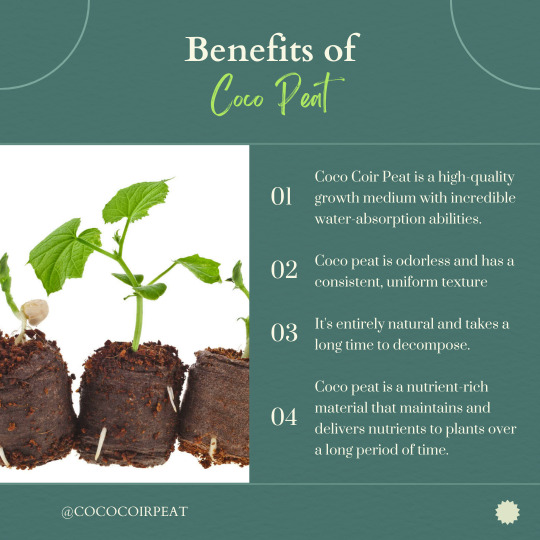
Cultivate your plants the natural way with Coco peat, the key to successful hydroponics farming. Join the eco-friendly movement and experience the benefits of using coco peat in your hydroponics system. Say goodbye to soil and hello to a healthier, more productive harvest, and dive into the world of hydroponics farming with Coco peat
#coco peat#coco pith#coir peat#coco coir pith#coco peat block#garden products#hydroponics#horticultural work#royal horticultural society#coir substrate#floricultural#farming#agriculture#farms#permaculture#agricultural#business#entrepreneurship#startup#industry#b2b#cargo#export#import export business#manufacturing#greenhouses#grow medium#ecofriendly
1 note
·
View note
Text
Unlock the insights into the world of coco peat exporters, exploring key players and market trends. Discover the dynamics shaping the industry with Seair Exim Solutions.
#coco peat export#coco peat exporters#coco peat exporters in india#coco peat importers#coco peat export data#Coir Pith export data#Coir Pith exporters in india#Coir Pith exporters
1 note
·
View note
Text
https://www.sinobaler.com/coco-pith-baler/

Which types of balers are suitable for compressing coco pith? Reach out to SINOBALER to discover your best coco pith baler. Let's get started
0 notes
Text
Buy 100% Dry Coco Peat & Coco Pith Soil Online at Nathan Coir
Coco peat, made from coconut husks, adds a fresh dimension to gardening. All skill levels, from novices to experienced green thumbs, can benefit from its adaptability. This natural marvel promotes plant growth with its outstanding water retention and aeration qualities. Learn how coco peat transforms gardening methods in this investigation, from improving soil structure to fostering ideal circumstances for numerous plants. Accept coco peat's potential to be a sustainable, environmentally beneficial alternative that takes your gardening endeavors to new heights.
#coco peat soil#coco peat online#coco peat amazon#buy dry coco peat#coco peat soil price#coco peat soil cost#buy coco peat soil#coco pith price per kg
0 notes
Text
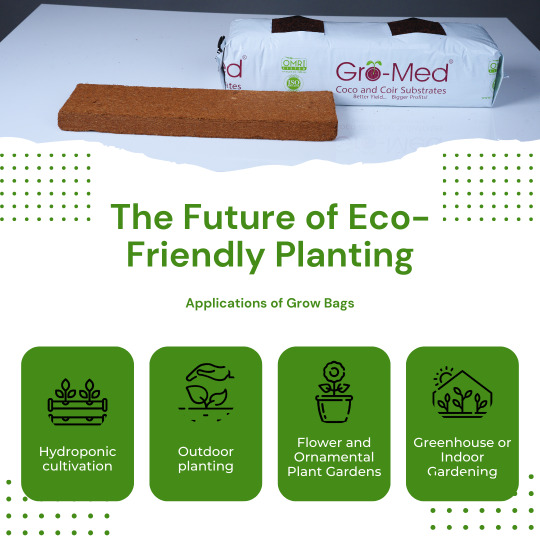
Maximize Your Garden's Potential with Coco Coir Grow Bags.
Coco Coir Grow Bags: Ideal for Healthy Plant Growth
Coco coir grow bags are an excellent choice for enhancing plant growth, offering superior aeration and irrigation capabilities. Made from a special blend of coco chips and coir pith, these grow bags provide the perfect air-to-water ratio for hydroponic systems, promoting healthy root development.
The grow bags are designed with customizable features, including plant holes, drip holes, and drainage holes, allowing farmers to tailor them to their specific needs. These holes ensure proper water flow and air circulation, creating an optimal growing environment for plants.
Planting and Drainage Features:
Plant Holes: Located on the upper surface of the grow bags, these holes are designed to accommodate the crops to be planted.
Drainage Holes: These are provided to prevent waterlogging by allowing excess irrigation water to drain freely.
Customization: The size, thickness, and weight of the grow bags can be adjusted based on the farmer’s requirements.
Coco coir grow bags are typically packed in high-density, UV-treated plastic bags to enhance durability. The medium has a neutral pH level of 5.5 to 7, which is ideal for nutrient release and encouraging vigorous plant growth.
UV Protection and Regional Customization:
In areas with high ultraviolet (UV) radiation, we offer grow bags with enhanced UV stability to ensure longevity and effectiveness.
For regions where UV radiation is minimal or not a concern, we recommend using cost-effective, UV-free bags (also known as "naked boards") for an affordable alternative.
Applications of Coco Coir Grow Bags
Coco coir grow bags are versatile and eco-friendly tools for a wide range of gardening and agricultural practices. Below are some of the key applications of these grow bags:
1. Hydroponic Gardening
2. Container Gardening
3. Seed Starting
Conclusion:
Coco coir grow bags offer a sustainable and highly effective solution for gardeners and farmers looking to enhance plant growth while promoting environmental responsibility. Their superior aeration, efficient water retention, and customizable features make them ideal for both hydroponic and traditional gardening setups. By providing the perfect balance of air and moisture, these grow bags foster healthy root systems and vigorous plant development. With options for UV-treated or UV-free bags tailored to different environmental conditions, coco coir grow bags are adaptable to a wide range of climates. Ultimately, they contribute to healthier plants, higher yields, and a more sustainable approach to modern agriculture.
2 notes
·
View notes
Text
Coco Peat – A Sustainable Growing Medium for Healthy Plants
Coco peat, also known as coir pith or coir dust, is a natural, eco-friendly growing medium made from the fibrous husk of coconuts. It has become a popular choice among gardeners and horticulturists due to its excellent water retention, aeration, and sustainability. Whether you're growing vegetables, flowers, or indoor plants, coco peat can significantly improve soil health and plant growth.
One of the key benefits of coco peat is its water-holding capacity. It can retain moisture up to eight times its weight, ensuring plants receive consistent hydration. This is especially useful in hot or dry climates where soil tends to dry out quickly. Coco peat also drains excess water efficiently, reducing the risk of root rot and promoting healthy root development.
Another major advantage is its lightweight and porous structure, which enhances soil aeration. Good air circulation around roots is crucial for plant respiration and nutrient uptake. Coco peat helps loosen heavy clay soils and improves the texture of sandy soils, making it a versatile additive for all types of gardens.
Coco peat is also pH-neutral to slightly acidic, which makes it suitable for a wide range of plants. It contains no harmful chemicals and is free from pathogens, making it safe for organic gardening. Though coco peat itself is low in nutrients, it works excellently when mixed with compost, vermicompost, or liquid fertilizers to create a balanced growing medium.
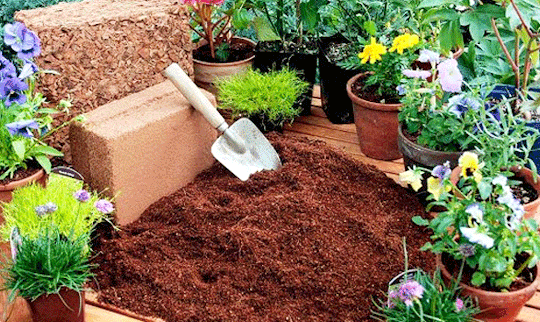
To use coco peat, it often comes in a compressed block form. Soaking it in water will expand the block into a fluffy, soil-like texture. It can then be used on its own for seed starting or mixed with potting soil to improve structure and moisture retention.
Additionally, coco peat is biodegradable and renewable, making it a sustainable alternative to peat moss, which is harvested from non-renewable bogs. Using coco peat helps reduce agricultural waste, as it repurposes coconut husk byproducts that would otherwise go unused.
In conclusion, coco peat is an excellent growing medium that supports healthy plant growth while also being environmentally responsible. Its ability to retain moisture, improve aeration, and enhance soil structure makes it a valuable addition to any garden. Whether you’re a home gardener or managing a larger cultivation setup, coco peat offers a reliable, sustainable foundation for thriving plants.
#coco peat for plants#how to order coco peat for plants#coco peat for home gardening#how to order coco peat online
0 notes
Text
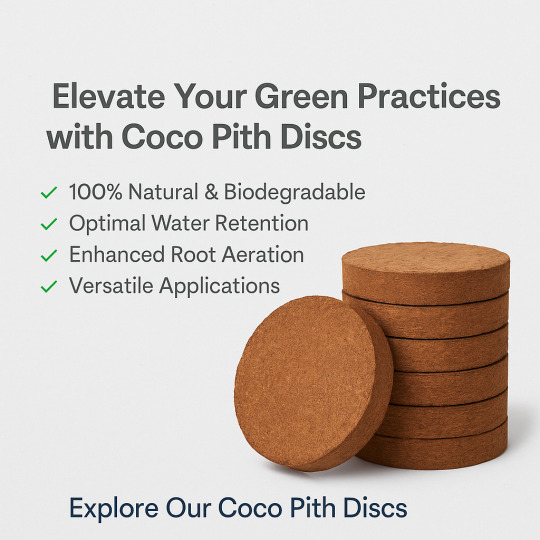
Coco Pith Discs (also known as coco peat discs or coir discs) are compressed, disc-shaped units made from the fibrous husk of coconuts. They're widely used in horticulture and agriculture for their excellent growing properties and eco-friendliness.
Pepagora offers high-quality, export-grade coco pith discs in various sizes, customized to suit your growing needs. Whether you’re a small-scale gardener or a commercial grower, these discs offer a clean, sustainable, and cost-effective solution.
#Pepagora#SustainableAgriculture#CocoPithDiscs#EcoFriendlyFarming#GreenSolutions#Horticulture#GardeningInnovation#businesslistingwebsite
0 notes
Text
Trusted Coco Peat Manufacturers in Tamil Nadu | Coir Products Manufacturers
Introduction
In the world of eco-friendly and high-quality coir-based products, Nathan Coir stands tall as one of the most trusted coco peat manufacturers in India. Based in Tamil Nadu, the heartland of the coir industry, we take pride in delivering premium solutions that cater to agricultural, horticultural, and industrial needs. Whether you are a home gardener or a commercial grower, our range of sustainable coir products ensures optimal plant growth and soil enrichment. As one of the top coir manufacturers in India, we are dedicated to promoting green practices through our high-quality offerings.
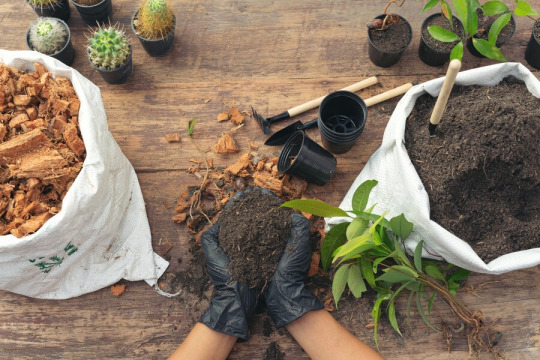
What is Coco Peat and Why is it Important?
A naturally occurring residue of coconut husks is coco peat, sometimes referred to as coir pith. It is widely used as a soil conditioner, potting mix ingredient, and hydroponic growing medium due to its excellent water retention, aeration, and nutrient absorption properties. Being a sustainable alternative to traditional soil, coco peat helps reduce environmental impact while enhancing plant health. As one of the leading coco peat manufacturers in Tamil Nadu, we ensure that our products are crafted to meet the highest industry standards.
Our Product Range
1. Coco Peat Products
As one of the leading coco peat manufacturers in India, we offer premium-quality coco peat products designed for various applications:
Coco Peat Soil – 3L Bag: Ideal for small-scale gardening projects and indoor plants.
Coco Peat Soil – 2L Pot Package: Specially designed for potted plants, ensuring healthy root development.
Cocopeat 5kg Block: A compressed block perfect for larger agricultural and horticultural needs, expanding significantly when hydrated.
2. High-Quality Potting Mixes
Beyond being a top coir manufacturers in India, Nathan Coir also provides nutrient-rich potting mixes tailored for different plant species. Our potting mixes are designed to promote proper aeration and drainage, supporting vigorous plant growth. As one of the reliable coir products manufacturers, we ensure that each product meets the highest quality standards.
Why Choose Nathan Coir?
Nathan Coir stands out among coco peat manufacturers in Tamil Nadu due to our commitment to quality, sustainability, and innovation. We offer premium coco peat products with excellent water retention, aeration, and nutrient absorption. Our diverse range of coir solutions caters to both small-scale gardeners and large-scale agricultural needs. With eco-friendly practices and years of industry expertise, we ensure superior products that promote healthy plant growth while minimizing environmental impact.
How to Use Coco Peat for Best Results
For Home Gardening
Mixing coco peat with organic manure or commercial fertilizers can enhance plant growth. For larger plants, adding a small quantity of soil or sand improves stability. Check our Coco Peat Use Guide for recommended mix ratios. As one of the most recognized coco peat manufacturers in Tamil Nadu, we ensure our products are user-friendly and effective.
For Hydroponics
Coco peat is an excellent medium for soilless farming, including tray-based or hydroponic grow systems. It provides superior moisture retention and supports root development, making it a preferred choice for hydroponic enthusiasts. Nathan Coir is a leading supplier among coco peat manufacturers in India, helping farmers transition to modern growing methods.
Conclusion
Nathan Coir is committed to delivering high-quality, eco-friendly coir-based solutions. As one of the leading coco peat manufacturers in TamilNadu, we provide sustainable products that enhance plant growth and soil health. Whether for gardening, hydroponics, or large-scale agriculture, our coir products ensure superior performance. Choose Nathan Coir for reliability, sustainability, and excellence in coir manufacturing.
Want to experience the benefits of premium coco peat? Contact us today and take a step towards sustainable and efficient farming and gardening!
#cocopeatmanufacturersinindia#cocopeatmanufacturersintamilnadu#coirmanufacturersinindia#coirproductsmanufacturers
0 notes
Text
How to Use Coconut Coir Pith in your Garden?
Using coconut coir pith, also known as coco peat or coir dust, in your garden offers several benefits, including water retention, aeration, and soil conditioning. Here's a step-by-step guide on how to use coconut coir pith effectively in your garden:
Procure Coconut Coir Pith:
Purchase coconut coir pith from gardening stores, nurseries, or online suppliers. It is commonly available in compressed bricks or blocks.
Rehydrate the Coir Pith:
Place the compressed coir pith bricks in a large container or tub.
Add water to the container, allowing the coir pith to absorb moisture and expand.
Allow the coir pith to soak in water for several hours or overnight until fully rehydrated.
Mix with Soil or Potting Mix:
Once fully rehydrated, fluff up the coir pith with your hands to loosen it.
Mix the rehydrated coir pith with your garden soil or potting mix in a ratio of 1:1 or as desired. Alternatively, you can use coir pith as a soilless growing medium.
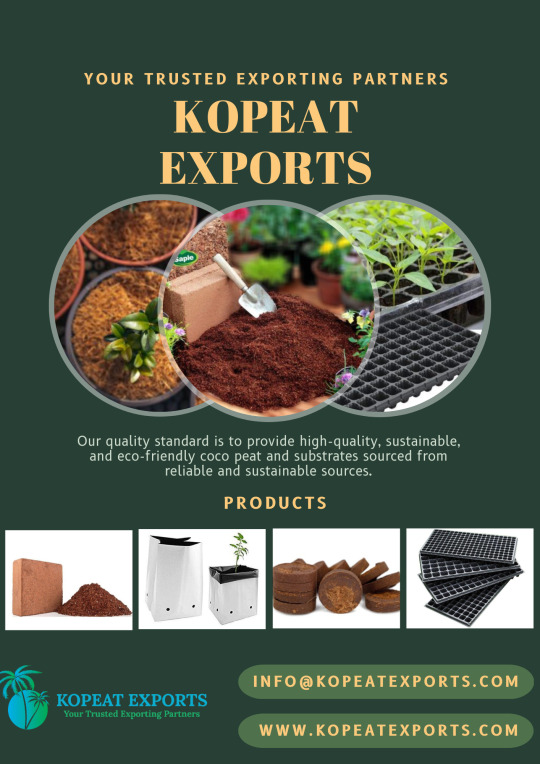
Use as Soil Amendment:
Incorporate the rehydrated coir pith into your garden soil as a soil amendment to improve its structure, moisture retention, and aeration.
Dig the coir pith into the soil to a depth of a few inches, ensuring even distribution throughout the garden bed.
Mulching:
Spread a layer of rehydrated coir pith on the soil surface around plants as mulch.
Mulching with coir pith helps conserve soil moisture, suppresses weed growth, and regulates soil temperature.
Seed Starting and Container Gardening:
Use rehydrated coir pith as a growing medium for starting seeds indoors or in seed trays.
Fill seed trays or pots with a mixture of coir pith and perlite or vermiculite for optimal seed germination and seedling growth.
Hydroponic and Aquaponic Systems:
Rehydrated coir pith can also be used as a growing medium in hydroponic and aquaponic systems.
Place the coir pith in growing containers or hydroponic trays and use it to grow plants without soil.
youtube
Watering and Maintenance:
Water your garden regularly to ensure adequate moisture levels, especially when using coir pith as a soil amendment or mulch.
Monitor the moisture levels in the soil and adjust watering as needed to prevent waterlogging or dryness.
Sustainable Disposal:
Coconut coir pith is a sustainable and biodegradable material. After use, it can be composted along with other organic waste to enrich the soil.
By following these steps, you can effectively use coconut coir pith in your garden to improve soil structure, retain moisture, and promote healthy plant growth.
#Coir Dust#coco coir pots#coco soil#coco peat#coir pots for plants#coco pith near me#coco pith#coco pot#coconut fiber for plants#coconut husk pith#coir fibre pith#Peat Grow Bags#Coir Pots For Plants#Coco Pot#Youtube
1 note
·
View note
Text
Article:
Coconut coir, also known as coco coir or simply coir, is a versatile natural fiber extracted from the outer husk of coconuts. Traditionally, coir was used mainly for making ropes and mats, but over the years, its utility has expanded across various industries due to its eco-friendly and sustainable properties. Below are some common uses of coconut coir:
Horticulture and Agriculture Coconut coir is widely used as a growing medium in horticulture, often as an alternative to peat moss. It is ideal for gardening, hydroponics, and seed starting due to its excellent water retention and aeration properties. Here are some horticultural applications:
Soil amendment: Coir is often mixed with soil to improve its structure, drainage, and moisture-holding capacity. It promotes root growth while maintaining aeration. Hydroponics: Coir is used as a soil substitute in hydroponic systems because it holds water efficiently without becoming waterlogged. Seed starting: Coir is also used in seed trays as a sustainable, biodegradable material to help seedlings sprout. Mulching: Coir chips or chunks are used as mulch around plants, helping to reduce water evaporation and suppress weeds.
Erosion Control Coconut coir is used in erosion control products like coir logs, blankets, and mats. These products help stabilize slopes, riverbanks, and shorelines by promoting vegetation growth and preventing soil from washing away. The fibers decompose slowly, allowing time for plant roots to establish, making coir effective in managing soil erosion in various environments.
Packaging Material As a biodegradable material, coconut coir is gaining traction as an alternative to synthetic packaging. Coir fibers can be processed into packaging material to wrap fragile items or even molded into biodegradable pots and containers. This is a great way to reduce the amount of plastic waste generated by packaging industries.
Construction Material Coconut coir has potential applications in the construction industry, particularly in producing eco-friendly building materials. For example, coir fiber can be used to manufacture composite boards, which can serve as an alternative to plywood or MDF. These boards are durable, lightweight, and eco-friendly, making them ideal for use in sustainable construction practices.
Textiles and Furniture Traditionally, coconut coir was primarily used for making mats, ropes, brushes, and brooms. Nowadays, its application in the textile industry has expanded to include the production of:
Coir mats and rugs: Popular in both indoor and outdoor settings for their durability and ability to trap dirt. Mattresses and cushions: Coir fibers can be combined with latex to create a firm, breathable material used in mattresses and furniture cushioning. Geotextiles: Coir geotextiles are widely used for stabilizing soil in landscaping, civil engineering projects, and road construction.
Pet Products Coir fiber is increasingly used in the production of pet products like bedding for reptiles, small mammals, and birds. The material is natural, biodegradable, and has high absorbency, making it an excellent choice for pet care.
Coir Pith Also known as coco peat, coir pith is a byproduct of the coir extraction process. It’s a lightweight, spongy material that is often used in gardening as a soil conditioner, mulch, or growing medium. Coir pith can hold large amounts of water and has excellent aeration, which makes it valuable in water conservation and organic farming.
Biofuels and Biomass Coconut coir is also used as a source of biofuel. The leftover husks from coir production can be processed into coir dust, which can then be compressed into briquettes or pellets used as biomass fuel. These fuels are renewable and can be used for heating or energy generation in a sustainable way.
Conclusion Coconut coir is a versatile, sustainable material with numerous applications across industries. Its properties make it an environmentally friendly alternative to synthetic materials, and as awareness of sustainability grows, its use is likely to expand further into new markets and applications. Whether in horticulture, construction, or packaging, coir is contributing to more eco-conscious practices globally. Please find useful products to buy.
I hope you like my article.
Thanks and Regards,
1 note
·
View note
Text
Are you a gardening enthusiast seeking ways to boost your plant’s growth? The most effective and eco-friendly solution is the coco soil and coir. Its immense prominence in horticulture has recently made every gardening enthusiast shift to coco. Coco soil is made from the coconut husk’s pith. In fact, it has several benefits – from maintaining moisture to improving plants’ growth.
0 notes
Text
How Does Coco Peat Export from India Work?

Coco peat, also known as coir pith, is a versatile and sustainable growing medium made from the fibrous husks of coconuts. As global demand for eco-friendly and sustainable products increases, coco peat export from India has seen significant growth. India is one of the leading producers and exporters of coco peat, supplying this valuable resource to various countries around the world. But what does the export process entail? Who are the key players? In this article, we'll explore the ins and outs of coco peat export from India, dive into the coco peat export data, and identify the leading coco peat exporters in India.
Why is Coco Peat Export from India Important?
What Makes India a Leader in Coco Peat Export?
India is one of the largest producers of coconuts globally, providing an abundant source of raw material for coco peat production. The country's advanced processing facilities and expertise in converting coconut husks into high-quality coco peat make it a significant player in the global market. Coco peat is widely used in horticulture, agriculture, and gardening due to its excellent water retention, aeration, and soil conditioning properties. As more countries shift towards sustainable and organic farming practices, the demand for coco peat continues to grow, solidifying India's position as a major exporter.
How Does Coco Peat Benefit the Environment?
Coco peat is an eco-friendly product that helps reduce agricultural waste by utilizing the byproducts of coconut processing. It is a sustainable alternative to peat moss, which is harvested from peat bogs and contributes to environmental degradation. By promoting the use of coco peat, India not only supports sustainable agriculture but also reduces the carbon footprint associated with traditional farming practices.
Who Are the Leading Coco Peat Exporters in India?
Which Companies Dominate the Coco Peat Export Market?
India is home to several leading coco peat exporters who play a crucial role in supplying this sustainable product to global markets. Some of the key exporters include:
Fibredust LLC: Known for its high-quality coco peat products, Fibredust LLC exports to various countries, including the USA and Europe.
Allwin Coir: A prominent player in the industry, Allwin Coir exports coco peat to major markets, focusing on consistent quality and sustainable practices.
Coir Green: Specializing in organic and eco-friendly coco peat, Coir Green has established a strong presence in the international market.
Sivaguru Coir Products: This company exports a wide range of coir-based products, including coco peat, to countries across Asia, Europe, and the Americas.
These exporters are instrumental in driving the growth of coco peat export from India by maintaining high standards and catering to the specific needs of different markets.
What is the Role of Small-Scale Exporters in the Coco Peat Industry?
In addition to large-scale exporters, numerous small and medium-sized enterprises (SMEs) contribute to the coco peat export industry in India. These smaller exporters often focus on niche markets, offering customized products such as organic or finely processed coco peat. Their flexibility and ability to cater to specific customer demands make them an essential part of the industry, helping to expand India's reach in the global market.
How is Coco Peat Export from India Conducted?
What Are the Steps Involved in Coco Peat Export?
The process of coco peat export from India involves several key steps to ensure that the product meets international standards and reaches its destination in optimal condition:
Harvesting and Processing: Coco peat is extracted from coconut husks, cleaned, and processed to remove impurities. It is then compressed into blocks, bricks, or bags for easy transport.
Quality Control: Before export, the coco peat undergoes rigorous quality checks to ensure it meets the specifications of the importing countries. This includes testing for pH levels, electrical conductivity, and moisture content.
Packaging: The processed coco peat is packaged in a way that ensures it remains uncontaminated and retains its quality during transit. Packaging options include compressed blocks, loose-filled bags, and grow bags.
Documentation: Exporters must prepare and submit necessary documents, including certificates of origin, phytosanitary certificates, and commercial invoices, to comply with the import regulations of the destination country.
Shipping: Coco peat is shipped via sea or air, depending on the destination and the urgency of the order. Exporters work with reliable logistics partners to ensure timely delivery and maintain the product's quality during transit.
What Are the Challenges in Exporting Coco Peat?
Exporting coco peat from India comes with several challenges, including:
Quality Standards: Different countries have varying quality requirements for coco peat, which means exporters must adhere to specific standards to avoid rejection at the destination port.
Logistics and Shipping Costs: Transporting coco peat, especially in large quantities, can be costly. Exporters must carefully manage logistics to keep costs down while ensuring timely delivery.
Market Competition: With several countries producing and exporting coco peat, Indian exporters face stiff competition in the global market. Maintaining high quality and competitive pricing is essential for staying ahead.
What Does Coco Peat Export Data Reveal?
What Insights Can Be Gained from Coco Peat Export Data?
Coco peat export data provides valuable insights into the industry's trends, growth patterns, and market dynamics. According to recent data, India continues to be one of the leading exporters of coco peat, with significant exports to countries like the USA, the Netherlands, Australia, and South Korea. The data also highlights the growing demand for coco peat in countries that are increasingly adopting sustainable farming practices.
Which Are the Major Coco Peat Importing Countries?
The major coco peat importing countries include:
USA: One of the largest markets for Indian coco peat, driven by the growing demand for organic and sustainable gardening products.
Netherlands: As a global leader in horticulture, the Netherlands imports large quantities of coco peat for use in greenhouses and nurseries.
Australia: With its focus on sustainable agriculture, Australia is a key market for Indian coco peat.
South Korea: The demand for coco peat in South Korea is driven by the country's increasing adoption of eco-friendly farming practices.
The data also shows a steady increase in exports to emerging markets, indicating the expanding global footprint of Indian coco peat.
How Can India Strengthen its Position in the Global Coco Peat Market?
What Strategies Can Help Boost Coco Peat Export from India?
To strengthen its position as a leading exporter of coco peat, India can adopt several strategies:
Enhancing Product Quality: Investing in advanced processing technologies and quality control measures can help Indian exporters produce higher-quality coco peat that meets the stringent standards of international markets.
Expanding Market Reach: By exploring new markets in Asia, Africa, and South America, Indian exporters can diversify their customer base and reduce reliance on traditional markets.
Sustainable Practices: Emphasizing organic and sustainable production methods can appeal to environmentally conscious consumers and boost demand for Indian coco peat.
Collaborative Efforts: Partnering with international agricultural organizations and participating in global trade fairs can help Indian exporters showcase their products and expand their market presence.
How Important is Innovation in the Coco Peat Industry?
Innovation plays a critical role in the coco peat industry. By developing new products and improving existing ones, Indian exporters can cater to the evolving needs of global markets. For example, the introduction of coco peat-based grow bags and biodegradable packaging options has opened up new opportunities for exporters. Continuous innovation ensures that Indian coco peat remains competitive and relevant in the global market.
Conclusion
Coco peat export from India is a thriving industry that capitalizes on the country's abundant coconut resources and advanced processing capabilities. With growing demand for sustainable and eco-friendly products worldwide, India's position as a leading exporter of coco peat is set to strengthen. By focusing on quality, expanding market reach, and embracing innovation, Indian exporters can continue to meet global demand and maintain their competitive edge in the market.
FAQs
1. What are the main coco peat importing countries? The main coco peat importing countries include the USA, Netherlands, Australia, and South Korea.
2. How do coco peat exporters in India ensure product quality? Exporters ensure product quality through rigorous quality control measures, including testing for pH levels, electrical conductivity, and moisture content.
3. Who are some leading coco peat exporters in India? Leading exporters include Fibredust LLC, Allwin Coir, Coir Green, and Sivaguru Coir Products.
4. What challenges do exporters face in the coco peat industry? Challenges include meeting varying international quality standards, managing logistics and shipping costs, and competing in a crowded global market.
5. How can India maintain its leadership in coco peat export? India can maintain its leadership by enhancing product quality, expanding into new markets, focusing on sustainable practices, and fostering innovation in the industry.
#coco peat export from India#coco peat exporters in India#coco peat export#cocopeat export from India#coco peat export data#coco peat importing countries
0 notes
Text
A Beginner's Guide to Coco Coir Pith: Everything You Need to Know

Introduction: If you’re new to gardening and looking for a sustainable and versatile growing medium, coco coir pith is an excellent choice. Derived from coconut husks, coco coir pith offers numerous benefits for plants and the environment. In this guide, we’ll explore all you need to know about this wonderful gardening resource.
What is Coco Coir Pith? Coco coir pith, also known as coco peat, is the fine dust obtained from coconut husks. It is a byproduct of coconut processing and has gained popularity as a sustainable alternative to traditional growing mediums like peat moss , soil , rock wool .
Advantages of Coco Coir Pith: Excellent water retention: Coco coir pith has exceptional water-holding capacity, ensuring plants receive consistent moisture. Improved aeration: It provides proper airflow to the roots, promoting healthy growth. pH-neutral: Coco coir pith has a neutral pH level, making it suitable for a wide range of plants. Nutrient-rich: It contains natural minerals and micronutrients that support plant growth. Sustainable and renewable: Coco coir pith is an eco-friendly choice, as it utilizes a byproduct of coconut production.
Using Coco Coir Pith: Seed starting: Coco coir pith is an ideal medium for germinating seeds, providing a suitable environment for root development. Potting mix amendment: Mix coco coir pith with potting soil to improve moisture retention and aeration. Hydroponics and soil-less gardening: Coco coir pith is widely used in hydroponic systems, providing a clean and sterile growing medium for plants.
How to Use Coco Coir Pith: Rehydration: Before use, soak coco coir pith bricks or blocks in water until they expand and become fluffy. Mixing ratios: Follow recommended ratios when blending coco coir pith with other growing mediums or soil. Watering: Monitor moisture levels and water accordingly, as coco coir pith retains water longer than traditional soil.
Sustainability and Coco Coir Pith: Coco coir pith is a renewable resource, utilizing coconut husks that would otherwise go to waste.
It reduces the reliance on non-renewable resources like peat moss.
Conclusion: Coco coir pith offers an array of benefits for both beginner and experienced gardeners. Its water retention properties, aeration capabilities, and sustainability make it a top choice for indoor and outdoor gardening. By embracing coco coir pith, you’re not only nurturing your plants but also contributing to a greener and more sustainable future.
Source URL: https://truecoirs.com/blogs/news/a-beginners-guide-to-coco-coir-pith-everything-you-need-to-know
1 note
·
View note
Text
Premium Coco Peat Grow Bags - Sustainable Plant Growth Solutions
In the realm of modern agriculture and gardening, the demand for sustainable and efficient planting solutions has grown significantly. Grow bags, particularly those made from premium coco peat, have emerged as a preferred choice among farmers and gardeners alike. Singhal Industries Pvt Ltd, a pioneering packaging company in India, has established itself as a leader in manufacturing high-quality coco peat grow bags tailored for various plant types, including cucumbers and trees. This article explores the benefits of these innovative grow bags, their applications, and why Singhal Industries stands out in this competitive market.
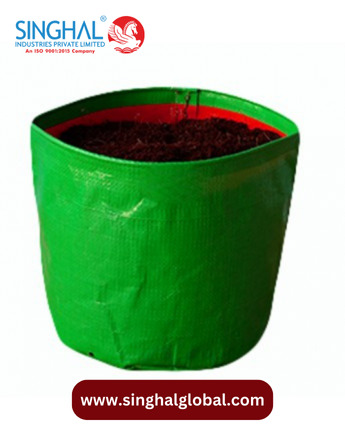
Understanding Coco Peat Grow Bags
Coco peat, alternatively known as coir pith, is derived as a residue from the extraction of coconut fibers. It is valued for its excellent water retention capacity, aeration properties, and sustainability. Coco peat grow bags utilize this material to create a conducive environment for plant growth. These bags are typically made from biodegradable materials, making them environmentally friendly and suitable for organic farming practices.
Benefits of Premium Coco Peat Grow Bags
Improved Aeration and Drainage: Coco peat promotes better aeration and drainage compared to traditional soil, which is crucial for root health and overall plant growth.
Water Retention: The high water retention capacity of coco peat ensures that plants receive adequate moisture, reducing water wastage and the frequency of irrigation.
Biodegradability: Eco-conscious growers appreciate that coco peat grow bags decompose naturally over time, minimizing environmental impact.
Versatility: These grow bags are versatile and can be used for various plants, from vegetables like cucumbers to larger trees, thanks to their sturdy construction and nutrient-rich composition.
Ease of Use: They are lightweight and easy to handle, making them ideal for both indoor and outdoor gardening projects.
Leading Grow Bag Manufacturers in Tamil Nadu
Tamil Nadu is renowned for its thriving agricultural industry and is home to several prominent grow bag manufacturers catering to diverse farming needs. Among these, Singhal Industries Pvt Ltd stands out as a leader in Grow bags manufacturers in Tamil Nadu. Singhal Industries leverages state-of-the-art manufacturing processes and eco-friendly materials to create durable and effective grow bags. Their products are favored by farmers and gardeners alike for their superior quality, reliability, and innovative designs tailored to enhance plant growth. Whether for commercial farming or home gardening, Singhal Industries' grow bags are trusted for their ability to support healthy root development, efficient water retention, and sustainable farming practices. Choosing Singhal Industries ensures access to premium grow bags that meet stringent quality standards and contribute to the success of agricultural ventures across Tamil Nadu and beyond.
Applications of Coco Peat Grow Bags
Singhal Industries' coco peat grow bags find applications in:
Commercial Agriculture: Large-scale farmers use these bags for cultivating crops like cucumbers, tomatoes, and peppers.
Home Gardening: Hobbyists and urban gardeners benefit from the compact size and portability of these bags for balcony gardens and small plots.
Nurseries: Tree nurseries utilize Fabric grow bags for trees to promote healthy root development and transplant success.
Why Choose Singhal Industries Pvt Ltd?
Singhal Industries has earned its reputation as a trusted provider of premium coco peat grow bags for several reasons:
Quality Assurance: Each batch of grow bags undergoes rigorous quality checks to ensure they meet industry standards and customer expectations.
Customization Options: The company offers customization services to tailor grow bags according to specific plant requirements and customer preferences.
Innovative Approach: Singhal Industries invests in research and development to continually improve its products, incorporating feedback from farmers and horticulturists.
Environmental Commitment: The use of eco-friendly materials underscores Singhal Industries' commitment to sustainable practices in agriculture.
Conclusion
In conclusion, premium coco peat grow bags from Singhal Industries Pvt Ltd represent a sustainable and efficient solution for modern agriculture and gardening needs. Whether you are cultivating Cucumbers in grow bags or nurturing trees with fabric grow bags, these products offer versatility, sustainability, and superior plant growth results. By choosing Singhal Industries, customers benefit from high-quality products backed by a commitment to innovation and environmental responsibility.
For more information on our range of coco peat grow bags and customization options, visit Singhal Industries Pvt Ltd today and discover the future of sustainable plant growth solutions.
Frequently Asked Questions (FAQs)
Q1: What are the advantages of using coco peat grow bags for cucumbers?
A1: Coco peat grow bags provide cucumbers with optimal moisture levels, excellent root aeration, and support healthy growth due to their natural properties.
Q2: Are fabric grow bags suitable for trees?
A2: Yes, fabric grow bags are ideal for trees as they promote strong root development, easy transplanting, and better nutrient absorption compared to traditional pots.
Q3: Where can I find reliable grow bag manufacturers in Tamil Nadu?
A3: Singhal Industries Pvt Ltd is renowned for its premium coco peat grow bags and serves customers across Tamil Nadu and beyond, ensuring quality and reliability.
0 notes
Text
The Wonder Material: Coco Peat Online and Its Uses
Coco peat, also known as coir pith, is a versatile and eco-friendly material derived from coconut husks. This brown, fibrous substance has gained immense popularity in recent times due to its numerous benefits for horticulture, agriculture, and even construction.
Why Choose Coco Peat Online?
Traditionally, coco peat was obtained from local vendors or nurseries. However, with the growing e-commerce industry, buying coco peat online offers several advantages:
Convenience: Order coco peat from the comfort of your home and have it delivered directly to your doorstep.
Variety: Online retailers offer a wider variety of coco peat products, including coco coir, coco chips, and pre-bagged mixes, compared to physical stores.
Competitive Prices: Online stores often have competitive pricing and deals on coco peat, making it a budget-friendly option.
Detailed Information: Reputable online retailers provide detailed product descriptions and specifications, allowing you to choose the right coco peat for your needs.
Using Coco Peat Online
Coco peat online can be used for a variety of purposes, including:
Potting Mix: Coco peat’s excellent drainage and aeration properties make it an ideal component of potting mixes for indoor and outdoor plants.
Seed Germination: The sterile nature of coco peat and its ability to retain moisture create the perfect environment for seed germination.
Soilless Gardening: Coco peat is a sustainable alternative to traditional soil-based gardening, particularly beneficial for urban spaces with limited balcony or rooftop gardens.
Hydroponics: The coarse fibers of coco peat are ideal for hydroponic systems, providing support for plant roots while ensuring efficient water flow.
Moisture Retention: Coco peat’s ability to absorb and retain large quantities of water makes it valuable for drought-prone areas, helping to conserve water and reduce irrigation needs.
Animal Bedding: Coco peat’s soft texture and absorbency make it a comfortable and hygienic bedding material for pets and livestock.

Finding the Right Coco Peat Online
When buying coco peat online, consider the following factors:
Type of Coco Peat: Choose between coco coir (coarse fibers), coco chips (larger chunks), or pre-bagged mixes containing coco peat with other ingredients like fertilizers.
Quantity: Decide on the amount of coco peat you need based on your project size. Many online retailers offer coco peat in various bag sizes to suit your requirements.
Quality: Opt for good quality coco peat from a reputable online store. Look for retailers that provide information on the source and processing of their coco peat to ensure it is eco-friendly and ethically sourced.
Conclusion
Coco peat online is a convenient and sustainable solution for various horticultural and agricultural needs. With its versatility, eco-friendly nature, and numerous benefits, coco peat is a wonder material that can help you achieve gardening success. So, explore the world of coco peat online and discover its potential to transform your gardening experience!
0 notes